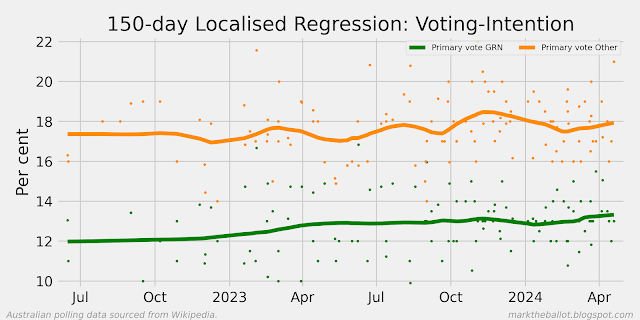I have updated my poll aggregations, and it is getting close. The Gaussian Random Walk (GRW) model has Labor on 50.1 per cent of the two-party preferred (2pp) vote share if an election was held now. The less tested Gaussian Process (GP) model has Labor on 49.7 per cent.
My simple local regression models have the 2pp vote share at 50 per cent even.
Nonetheless, there remains a substantial primary vote for the non major parties, which makes it harder to project who will form government on the basis of the 2pp vote share.
Comments
At this point, my best guess is that the polls are currently pointing to a minority Labor government, with an increased cross bench.
Part of the reason I have Labor ahead when the 2pp polling aggregte is around 50/50 is historical. First term governments usually win a second term. There is an inertia built into the super-majorities governments typically get in their first term (and with the Herculean task faced by oppositions to rebuild after change-of-government elections). The last one-term Federal government was the Scullin government that had the misfortune of being elected just after the 1929 Wall Street Crash, in the midst of the Great Depression.
A second reason is that the 2pp poll aggregates have only just hit 50/50. I would want to see the 2pp poll aggregates consistently below 50 per cent for some months before seriously reconsidering Labor's chances at the next election. Governments have the advantage going into an election. They have the advantage in setting the date for an election, and they can use the expertise of the public service to better prepare for an election (before it has been called).
A third reason for caution is the possibility that the latest Resolve Strategic poll is a statistical outlier. That 2pp poll came in at 50/50, but in the aggregation models, given historical systemic house bias patterns, the latest poll was treated more like 53.5 for the Coalition and 46.5 for Labor. It is possible that Resolve Strategic has changed its polling methodology, and we will therefore need to change how we treat these Resolve Strategic polls in the future. Ot it could just be part of the usual noise of opinion polling, and going forward we will see the long-standing systemic bias patterns return to how they have been.
Finally, it is worth noting that getting less than 50 per cent of the 2pp vote does not necessarily mean defeat. Governments have won in the past with narrow 2pp vote losses. For example: Howard in 1998 with 49.0 per cent, Hawke in 1990 (49.9%), Gorton in 1969 (49.8%), and Menzies in 1961 (49.5%) and 1954 (49.3%).

















No comments:
Post a Comment